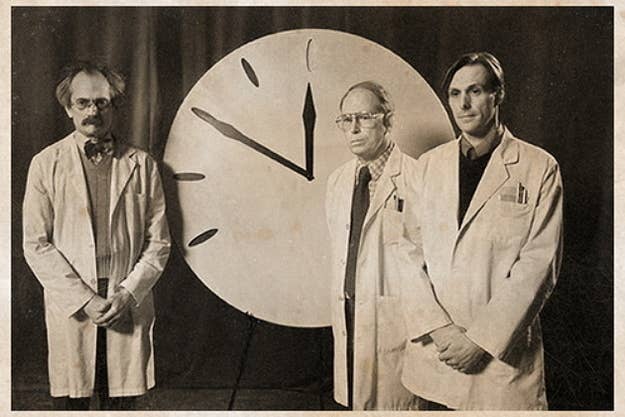
Every year, the online magazine Edge--the so-called smartest website in the world, helmed by science impresario John Brockman--asks top scientists, technologists, writers, and academics to weigh in on a single question. This year, that query was "What Should We Be Worried About?", and the idea was to identify new problems arising in science, tech, and culture that haven't yet been widely recognized.
This year's respondents include former presidents of the Royal Society, Nobel prize-winners, famous sci-fi authors, Nassem Nicholas Taleb, Brian Eno, and a bunch of top theoretical physicists, psychologists, and biologists. And the list is long. Like, book-length long. There are some 150 different things that worry 151 of the planet's biggest brains. And I read about them all, so you don't have to: here's the Buzzfeedized version, with the money quote, title, or summary of the fear pulled out of each essay. Obviously, go read the rest if any of the below get you fretting too.
What keeps the smartest folks in the world awake at night? Here goes:
1. The proliferation of Chinese eugenics. – Geoffrey Miller, evolutionary psychologist.
2. Black swan events, and the fact that we continue to rely on models that have been proven fraudulent. – Nassem Nicholas Taleb
3. That we will be unable to defeat viruses by learning to push them beyond the error catastrophe threshold. – William McEwan, molecular biology researcher
4. That pseudoscience will gain ground. – Helena Cronin, author, philospher
5. That the age of accelerating technology will overwhelm us with opportunities to be worried. – Dan Sperber, social and cognitive scientist
6. Genuine apocalyptic events. The growing number of low-probability events that could lead to the total devastation of human society. – Martin Rees, former president of the Royal Society
7. The decline in science coverage in newspapers. – Barbara Strauch, New York Times science editor

8. Exploding stars, the eventual collapse of the Sun, and the problems with the human id that prevent us from dealing with them. -- John Tooby, founder of the field of evolutionary psychology
9. That the internet is ruining writing. – David Gelernter, Yale computer scientist
10. That smart people--like those who contribute to Edge--won't do politics. –Brian Eno, musician
11. That there will be another supernova-like financial disaster. –Seth Lloyd, professor of Quantum Mechanical Engineering at MIT
12. That search engines will become arbiters of truth. --W. Daniel Hillis, physicist
13. The dearth of desirable mates is something we should worry about, for "it lies behind much human treachery and brutality." –David M. Buss, professor of psychology at U of T
14. "I'm worried that our technology is helping to bring the long, postwar consensus against fascism to an end." –David Bodanis, writer, futurist
15. That we will continue to uphold taboos on bad words. –Benhamin Bergen, Associate Professor of Cognitive Science, UCS
16. Data disenfranchisement. –David Rowan, editor, Wired UK
17. That digital technologies are sapping our patience and changing our perception of time. –Nicholas G. Carr, author
18. An "underpopulation bomb." –Kevin Kelly, editor-at-large, Wired.
19. That funding for big experiments will dry up, and they won't happen. –Lisa Randall, Harvard physicist
20. "I worry that as the problem-solving power of our technologies increases, our ability to distinguish between important and trivial or even non-existent problems diminishes." –Evgeny Morozov, contributing editor, Foreign Policy
21. Not much. I ride motorcycles without a helmet. –J. Craig Venter, genomic scientist
22. Catharsis is a transcendent joy that—can you repeat question? –Andrian Kreye, editor, German Daily Newspaper
23. "I've given up asking questions. l merely float on a tsunami of acceptance of anything life throws at me... and marvel stupidly." (complete answer)--Terry Gilliam
24. "We should be worried about the new era of Anthropocene—not only as a geological phenomenon, but also as a cultural frame." –Jennifer Jacquet, clinical assistant professor of environmental studies, NYU
25. Cultural extinction, and the fact that the works of an obscure writer from the Caribbean may not get enough attention. –Hans Ulrich Obrist. curator, Serptine Gallery
26. The Danger Of Inadvertently Praising Zygomatic Arches. --Robert Sopolsky, neuroscientist

